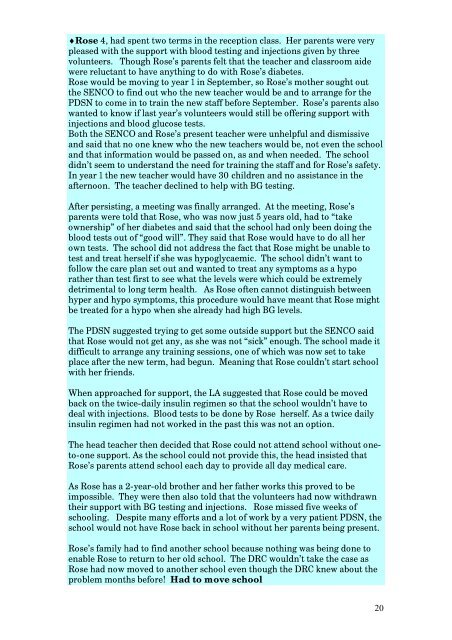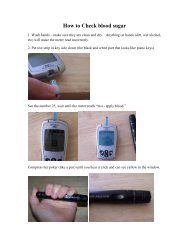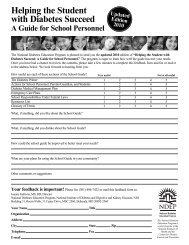Every Child Matters - Children with Diabetes
Every Child Matters - Children with Diabetes
Every Child Matters - Children with Diabetes
- No tags were found...
You also want an ePaper? Increase the reach of your titles
YUMPU automatically turns print PDFs into web optimized ePapers that Google loves.
♦Rose 4, had spent two terms in the reception class. Her parents were verypleased <strong>with</strong> the support <strong>with</strong> blood testing and injections given by threevolunteers. Though Rose’s parents felt that the teacher and classroom aidewere reluctant to have anything to do <strong>with</strong> Rose’s diabetes.Rose would be moving to year 1 in September, so Rose’s mother sought outthe SENCO to find out who the new teacher would be and to arrange for thePDSN to come in to train the new staff before September. Rose’s parents alsowanted to know if last year’s volunteers would still be offering support <strong>with</strong>injections and blood glucose tests.Both the SENCO and Rose’s present teacher were unhelpful and dismissiveand said that no one knew who the new teachers would be, not even the schooland that information would be passed on, as and when needed. The schooldidn’t seem to understand the need for training the staff and for Rose’s safety.In year 1 the new teacher would have 30 children and no assistance in theafternoon. The teacher declined to help <strong>with</strong> BG testing.After persisting, a meeting was finally arranged. At the meeting, Rose’sparents were told that Rose, who was now just 5 years old, had to “takeownership” of her diabetes and said that the school had only been doing theblood tests out of “good will”. They said that Rose would have to do all herown tests. The school did not address the fact that Rose might be unable totest and treat herself if she was hypoglycaemic. The school didn’t want tofollow the care plan set out and wanted to treat any symptoms as a hyporather than test first to see what the levels were which could be extremelydetrimental to long term health. As Rose often cannot distinguish betweenhyper and hypo symptoms, this procedure would have meant that Rose mightbe treated for a hypo when she already had high BG levels.The PDSN suggested trying to get some outside support but the SENCO saidthat Rose would not get any, as she was not “sick” enough. The school made itdifficult to arrange any training sessions, one of which was now set to takeplace after the new term, had begun. Meaning that Rose couldn’t start school<strong>with</strong> her friends.When approached for support, the LA suggested that Rose could be movedback on the twice-daily insulin regimen so that the school wouldn’t have todeal <strong>with</strong> injections. Blood tests to be done by Rose herself. As a twice dailyinsulin regimen had not worked in the past this was not an option.The head teacher then decided that Rose could not attend school <strong>with</strong>out oneto-onesupport. As the school could not provide this, the head insisted thatRose’s parents attend school each day to provide all day medical care.As Rose has a 2-year-old brother and her father works this proved to beimpossible. They were then also told that the volunteers had now <strong>with</strong>drawntheir support <strong>with</strong> BG testing and injections. Rose missed five weeks ofschooling. Despite many efforts and a lot of work by a very patient PDSN, theschool would not have Rose back in school <strong>with</strong>out her parents being present.Rose’s family had to find another school because nothing was being done toenable Rose to return to her old school. The DRC wouldn’t take the case asRose had now moved to another school even though the DRC knew about theproblem months before! Had to move school20





